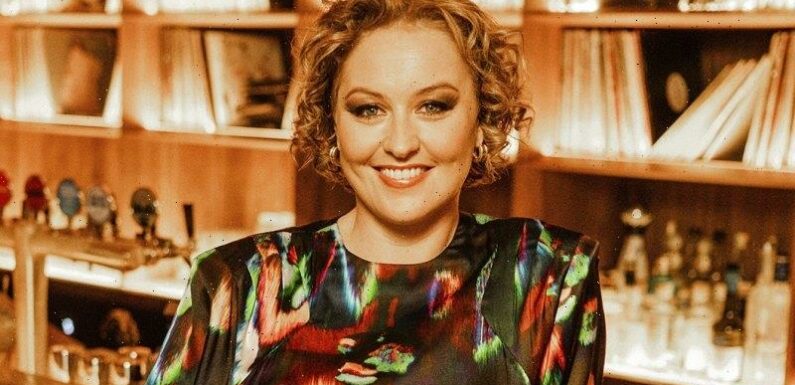
When they’re firing, TV talk shows make it look easy. The host sets the tone. He or she will be convivial, relaxed and delighted to see us; the atmosphere will be inviting, and the conversation will flow as it might at a great dinner party. The ease, of course, is an illusion. Like a good dinner party, it requires careful planning and preparation: the topics on the menu, the mix of guests, the seating arrangements, the pacing.
When things unfold as hoped, it all blends together as though there’s a serendipitous alchemy. And the results demonstrate why viewers will habitually return to interview programs, welcoming them into their homes like friends. From “Parky” to Andrew Denton, from David Letterman to Graham Norton.
Zan Rowe’s show grew from a segment on her Triple J radio program in which guests are invited to select five songs that would feature on their mixtapes.Credit:ABC
However, getting it right on the night isn’t guaranteed and sometimes the event fails to fire. This year, the ABC has had three shots at creating interview programs that they hope will become fixtures. One gets it right; the other two have promise, but they’re over-cooked.
First came The ABC Of . . . (ABC iview), hosted by actor David Wenham and built on mining the ABC’s archives. Guests, one per half-hour program, reflect on their lives and careers, prompted by a selection of news stories, photos and clips. Wenham is a personable presenter and his show hinges on the cost-effective use of a perhaps under-exploited resource. But the show is suffocated by its format.
There’s a continual sense of the host hurrying through a prescribed agenda, conscious that he’s required to refer to a number of seminal events in order to present a comprehensive chronology. So there’s little space for the conversation to flourish. The interactions feel rushed and jumpy, and perhaps as a result of this or the clunky editing, there’s also a failure to ask follow-up questions, even when the subject’s responses are crying out for them.
More recently has come Fran Kelly’s Frankly (ABC, Friday, 8.30pm and iview), featuring several guests per half-hour and a superfluous house band. The show is still in its infancy, but the bumpy early outings also suggest a tendency to rush the conversations. Any of the well-chosen guests crammed into tight slots could have occupied an entire episode. Packing them in produces an unsatisfying superficiality. And the jarring edits make it seem as if the producers are scared to allow any space for pauses, fearful we’ll get bored or, perhaps, that we have the attention spans of goldfish.
Rowe with Tony Armstrong for an episode of Take 5 with Zan Rowe.
The third show, Take 5 With Zan Rowe, which has just finished its debut season (all episodes on iview), is the best of the bunch. Rowe’s show, which grew from a segment on her Triple J radio program, is built around music. The guests, who comfortably fill half-hour episodes solo, are invited to select five songs that would feature on their mixtapes.
The format arrives ready-made from its radio days and Rowe, the ABC’s national music correspondent, radiates warmth, knows her field intimately and clearly has a passion for it. After years of TV training (co-hosting New Year’s Eve specials, ABC 90 Celebrate, Tropfest and Ausmusic Month specials; contributing to News Breakfast), she has a sociable ease on camera that’s welcoming for her subjects and viewers.
She doesn’t make the common mistake of inserting herself too insistently or expansively into the mix. Her questions are astute and concise, revealing her knowledge of music and her guest. She unobtrusively guides the discussion and allows the interviewees ample room for reflections and anecdotes. Each episode produces memorable and sometimes moving exchanges.
Take 5 gets the basics right. The decor provides a fitting frame for the conversations: a couple of chairs, a small table, turntables, images of records stacked against the back wall when the interview is shot in a studio. No fussy bells and whistles. The opening credits feature an audio cassette being flipped into an old-style tape recorder with a satisfying clunk.
Five songs is the ideal number for this episode length, although you don’t hear them in their entirety. But there’s sufficient time to appreciate enough of each track to get a sense of its qualities and for Rowe and her guests to talk about them.
The simple format means that the interviewees – Guy Pearce, Keith Urban, Missy Higgins, Tony Armstrong (the only non-musician) and Tori Amos – arrive ready to rock. They’ve set the agenda and had time to think about their choices, so they’re forthcoming and eloquent about why they’ve made them. And while Higgins’ episode is particularly raw and revealing, it unfolds with such sensitivity and candour that it never feels exploitative.
The series has numerous highlights. Rowe and Armstrong happily dancing as they enthuse about the irresistible pull of Donna Summer’s I Feel Love. Higgins detailing the impact of Sarah McLachlan and her music at two critical points in her life. Pearce talking about Kate Bush’s Night of the Swallow in relation to the loss of his test-pilot father in a plane crash and his own recent experiences of fatherhood. Urban recalling his tough early days in Nashville, trying to find his sound and his foothold in the music scene, and the inspiration provided by k.d. lang, who exuberantly went her own trailblazing way. Piano virtuoso Amos discussing years of rejection as she endeavoured to find her own style, and the profound influence of Rickie Lee Jones, U2 and Nina Simone along the way.
As with that ideal dinner party, Take 5 looks as though a fine time is had by all. Here’s hoping there will be more. Play it again, Zan.
Find out the next TV, streaming series and movies to add to your must-sees. Get The Watchlist delivered every Thursday.
Most Viewed in Culture
From our partners
Source: Read Full Article

